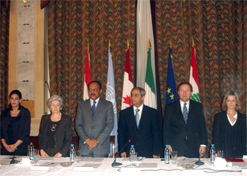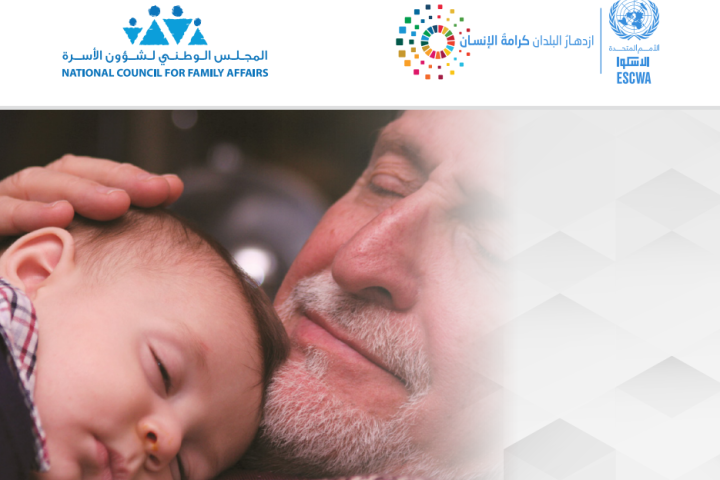UN-ESCWA Executive Secretary, Bader Omar AlDafa, stressed the commitment of UN-ESCWA to pursue with its developmental projects in Lebanon, despite the hardship the region is going through. He asserted that the determination of our peoples remains the driving force behind the effective contribution to development efforts and the hope to build a better and stable future. AlDafa said that the link between development and peace is one of the most important concepts that form the basis of UN activities, and one of the mains goals the organization seeks to achieve.
AlDafa was speaking at the launch of the new E-Caravan-Phoenix project for South Lebanon, during a press conference under the auspices ofLebanese Minister of Culture, Tarek Mitri on Wednesday 9 April 2008 in the Grand Serail. The project is implemented by "Fondation Saradar" in partnership with the Italian Cooperation for Development, Ross Program - Embassy of Italy, the UN-ESCWA, and the Canada Fund for local initiatives- Embassy of Canada.
AlDafa considered the "Phoenix" project as the expression of the will to pursue support for development activities amidst the difficult times and challenges that both Lebanon and the whole region are facing. He added that it was the destiny of Lebanon and its life-loving people to overcome crisis and strive for a future full of peace, development and stability. He also said that UN-ESCWA draws its determination to pursue its efforts from the spirit of resolve its partners and the peoples of the region have. He asserted development should be a pillar for community stability and cohesion, especially that improving economic and social conditions and raising living standards in countries of the region helps to alleviate prejudice and consolidate peace and stability.
UN-ESCWA and its partners had launched the first E-Caravan in January 2006. the Caravan had begun operation in Naqoura before reaching Ayta Al Shaab, where it was destroyed during the July 2006 war while it was parked in the Ayta Al Shaab Public School. The second E-Caravan will head to its first stop in Qana, to begin operation on 12 April 2008. Two additional E-Caravans are expected to be launched later, to cover the North and the Bekaa, especially remote villages.
The meeting was also attended by the President of "Fondation Saradar" Mrs. Marie-Claude Saradar, the First Secretary of the Italian Embassy in Lebanon, Daniela Tonon, representing Ambassador Gabriele Checcia, the Canadian Ambassador to Lebanon Mr. Louis de Lorimier, and the Governor of South Lebanon Mr. Malek Abdel Khaleq. A quorum of diplomatic and media figures and a number of representatives of UN agencies in Lebanon are also invited to attend the event, in addition to figures from the private and public sectors and regional and international organizations.
Saradar said that launching the E-Caravan comes as a part of the mission to disseminate computer alphabetization to all, therefore opening the doors of the future to them. She added that the multiplication of the numbers of people willing to learn new technologies proves how crucial it is to acquire this knowledge.
For his part, De Lorimier reminded the audience of the mythical bird that dies and rises from its own ashes, especially that it bears a special significance in the history of Lebanon, which has suffered wars and is in the grips of turmoil and uncertainty. Also, by spreading communication technologies, the E-Caravan resembles ancient Phoenicians who contributed to spreading the alphabet across the Mediterranean.
Tonon focused on the attributes of this Caravan that will tour Southern villages and bring marginalized social strata, namely children, women and those with special needs, closer to technology, opening new horizons for them in the world of knowledge.
The E-Caravan is a fully equipped mobile computer school that travels to clusters of villages to introduce the world of Information Technology (IT) to the communities of South Lebanon. It targets local communities faced with great challenges and obstacles which hinder their development. It aims at creating new opportunities through ICT, with a view to improve the economic and social status of these communities by creating new job opportunities and establishing income-generating projects. Competent trainers are expected to train around 1,400 people, including disabled and visually impaired persons, approximately 80 trainees to become trainers, 150 persons from Micro & Small Enterprises (MSEs) and 100 participants who will establish and manage an information network during the course of the 200 planned training sessions per year.
The E-Caravan is equipped with a network of ten PCs with flat screens, one laser printer, one LCD projector with screen, two satellite connection modems, and other accessories. The E-Caravan also has a ramp that will provide easy access for disabled persons and is furnished with special software to welcome visually impaired persons. The content of the different training sessions is based on the needs of the target population. The courses range from ones specifically designed for beginners to courses for future trainers, to the empowerment of active persons in Micro & Small Enterprises and to specific sessions for website managers.
Three NGOs - Baldati, the Lebanese Physical Handicapped Union (LPHU), and the Youth Association of the Blind (YAB) - are engaged in the E-Caravan-Phœnix project.
The project is implemented in partnership with concerned private companies and in close collaboration with municipal councils, existing local and international organizations and UN agencies. 'E-Caravan' partners include, An-Nahar, Bankers Assurance sal, Capital-Outsourcing, Carrosserie Abillama, Compagnie de construction immobilière, Compagnie des sources du Liban- Sannine, Early Bird, Formatech Integrated Learning Center, Inconet-Data Management (IDM), Inmarsat Global Limited, L’Orient-Le Jour, Librairie Halim, Murex Systems, Saccal Systems, The Daily Star, Triband Middle East sal Off Shore, Triple C and UNIFIL.




